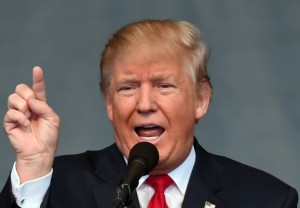After months of threatening American and Japanese automakers with a 35% tariff if they produce vehicles in Mexico and then try to import them for sale in the United States, President-elect Donald Trump broadened the scope of his “plan” to include Canada and Germany.
The incoming Trump administration is suggesting that cars in built in Canada might also face the so-called border tax that the President-elect Trump has claimed he might impose on cars built in Mexico.
Shortly after that, in an interview with the German newspaper Bild, he suggested that German automakers could be subject to the tariff as well.
“If you want to build cars in the world, then I wish you all the best. You can build cars for the United States, but for every car that comes to the USA, you will pay 35% tax,” Trump said in remarks translated into German.
“I would tell BMW that if you are building a factory in Mexico and plan to sell cars to the USA, without a 35% tax, then you can forget that,” Trump said.
BMW officials said they have no plans to alter they’re production plans in the U.S. or Mexico, where like its counterparts Mercedes-Benz and Volkswagen they have substantive operations.

Dieter Zetsche, Mercedes-Benz chief, suggested that plans to levy a large tariff are counterproductive to economy growth, but if Trump moved ahead, the automaker would have to adapt.
(NADA Chief implores Trump to undo Obama auto rules. Click Here for the story.)
Mercedes-Benz boss Dieter Zetsche touched on the automaker’s manufacturing plans in the U.S. and Mexico during the North American International Auto Show, including a big U.S. plant and plans for a new small luxury plant they will share in Mexico with Infiniti, “We believe we have a reasonable and responsible plan going forward.”
He said he wanted to avoid dealing in “what-ifs” until any actual plans v tweets come from the Trump Administration. However, he warned that populist calls for restrictions are risky. “I think it’s a problem for growth,” and flies in the face of history showing that free trade improves global growth and incomes.
That said, “Politics set the framework for the economy and companies have to adjust to the framework, if needed.”
Trump’s talk and tweets of a border tax on vehicles from Mexico, which have been aimed at companies such General Motors and Toyota, have caused an uproar within the global auto industry, which has come to depend on the relatively free movement of vehicles and components across international border.
Many have wondered can Trump actually levy a tax without assistance from Congress. The short-term answer is yes, although apparently not at 35%.
“The president’s powers are considerable. He can legally impose tariffs of up to 15 percent for 150 days. Trump is not constrained by Congress,” said Simon Evenett, professor of international trade at Switzerland’s University of St Gallen, told Reuters.
“Even if foreign companies object and seek to challenge the legality of tariffs, it will take at least 18 months to get decided. Corporate strategies will be disrupted by then.”
(Click Here to see how scrubbing NAFTA could kill 30,000 jobs.)
Trump’s implementation of a punitive tariff would make “the American auto industry worse, weaker and more expensive,” Sigmar Gabriel, Germany’s economy minister, told Bild. He noted that European makers wouldn’t be intimidated by Trump’s musings. “We’re not weak and inferior,” he said.
Sean Spicer, who has been names the President-elect’s press secretary, said during a conference with reporters last week the much-threatened tax could apply to Canadian-made vehicles. General Motors, Ford, Fiat Chrysler, Toyota and Honda all make vehicles in Canada, including key models such as the Chrysler Pacifica, Ford Edge, Chevrolet Equinox and Toyota RAV4 in Canada.
A border tax will apply “when a company that’s in the U.S. moves to a place, whether it’s Canada or Mexico or any other country seeking to put U.S. workers at a disadvantage,” Spicer, a said Bloomberg News reported.
Trump’s spokesmen often issue contradictory states but until last week’s conference call with Spicer Canada had not come up in the discussion on auto exports/or imports, according to the Toronto Globe and Mail.
However, a report by the Center for Automotive Research in Ann Arbor, Michigan, warned that killing off the North American Free Trade Agreement would kill thousands of jobs in the U.S., Canada and Mexico.
Foreign Affairs Minister Chrystia Freeland’s office told The Globe and Mail it is in talks with Trump staff on the matter and noted there is significant opposition to a border tax within the United States.
“We have a constructive working relationship with the Trump transition team, and discussions are ongoing,” said Joseph Pickerill, Freeland’s director of communications.
(Trump jabs Toyota over Mexico. Click Here for the story.)
“This particular proposal is something that has been floated for quite some time and is opposed by at least as many American lawmakers as support it, but at this stage, we are going to continue to work with the incoming administration on the inter-connectedness and to the mutual benefit of our two economies,” he said.
Joseph Szczesny contributed to this report.


If Trump imposes 35 % tariff to Canada, I guess we should turn off the oil, gas & water to the US. Only a moron would impose a tariff to Canada.